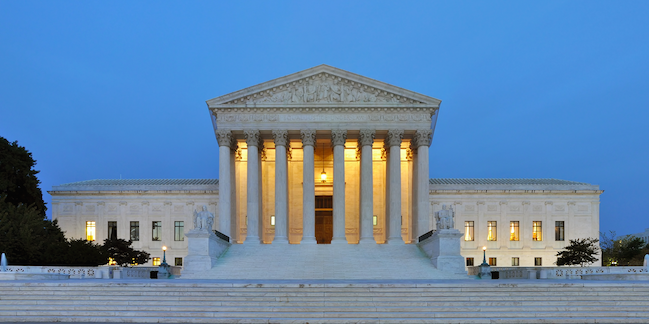Deference and Foreign Law in In re Vitamin C
On Tuesday Nov. 14, the Solicitor General filed a brief urging the Supreme Court to grant certiorari in In re Vitamin C Antitrust Litigation, an international antitrust case that raises important questions about international comity and the interpretation of foreign law.

Published by The Lawfare Institute
in Cooperation With

On Tuesday Nov. 14, the Solicitor General filed a brief urging the Supreme Court to grant certiorari in In re Vitamin C Antitrust Litigation, an international antitrust case that raises important questions about international comity and the interpretation of foreign law. If the Supreme Court accepts this recommendation, it will be setting itself up to squarely address the level of deference that federal courts should provide to foreign governments’ interpretations of their own domestic laws for the first time. The results may impact international litigation—as well as U.S. foreign relations—for many years to come. For Lawfare readers, this makes In re Vitamin C a case worth watching.
The respondents in In re Vitamin C are Chinese manufacturers and exporters of Vitamin C that have been accused of anti-competitive behavior in violation of the Sherman Act. The companies do not contest these allegations but argue that they were compelled to act by Chinese laws and regulations. In an amicus brief, China’s Ministry of Commerce presented its own view of the relevant Chinese legal requirements, which supported this position. The district court rejected the Ministry’s interpretation, however, on the grounds that it was not adequately supported by relevant Chinese legal texts and inconsistent with prior representations that Chinese authorities had made in other forums. On appeal, the Second Circuit reversed, stating:
[W]hen a foreign government . . . provide[s] a sworn evidentiary proffer regarding the construction and effect of its laws and regulations, which is reasonable under the circumstances presented, a U.S. court is bound to defer to those statements . . . even if that representation is inconsistent with how those laws might be interpreted under the principles of our legal system. . . . Not extending deference in these circumstances disregards and unravels the tradition of according respect to a foreign government's explication of its own laws, the same respect and treatment that we would expect our government to receive in comparable matters before a foreign court.
The petitioners contend that this “rigid” standard of deference is in conflict with the approach taken by at least some other circuit courts, which generally allow for more scrutiny of foreign governments’ assertions. And while the respondents attempt to downplay the degree of deference that the Second Circuit’s decision would provide, the Solicitor General concurs with the petitioners that the Second Circuit’s standard—which he interprets as requiring deference wherever an offered interpretation is not “facially unreasonable”—is in error.
At the heart of this dispute is Federal Rule of Civil Procedure 44.1, which sets out the procedures that federal courts use to determine the content of foreign law. Adopted in 1966 as a response to the problematic “foreign law as fact” approach generally pursued under common law, Rule 44.1 presently states:
A party who intends to raise an issue about a foreign country's law must give notice by a pleading or other writing. In determining foreign law, the court may consider any relevant material or source, including testimony, whether or not submitted by a party or admissible under the Federal Rules of Evidence. The court's determination must be treated as a ruling on a question of law.
This gives federal courts immense discretion over the types of evidence they may rely on in determining foreign law, which can range from primary legal texts to testimony from legal experts. The only check on this authority within Rule 44.1 is the fact that it treats any resulting determinations as rulings on questions of law, making them subject to de novo review on appeal.
Yet federal courts rarely approach foreign law with the free hand that Rule 44.1 appears to allow. More often, they give determinative weight to the official interpretations of foreign law put forward by foreign government officials, whether as a party, as amicus curiae, or in another context. The most notable example of this practice is the Supreme Court’s own 1942 decision in United States v. Pink, which treated an “official declaration” by a Russian “Commissariat for Justice” as providing the “conclusive” interpretation of an earlier Russian decree after finding that evidence supported the conclusion that the Commissariat had “[the] power to interpret existing Russian law.” Several courts—including the Second Circuit in In re Vitamin C—have cited Pink as support for the conclusion that some deference to foreign governments is advisable, if not required. Yet the extent to which the holding in Pink survived the adoption of Rule 44.1 remains a subject of debate.
Views on the present state of this case law differ. While they disagree on the Second Circuit’s In re Vitamin C opinion, both the respondents and the Solicitor General are relatively sanguine about there being a degree of consensus among the rest of the circuits. The Solicitor General in particular describes the courts of appeals as having a “general practice of affording substantial—but measured—deference to a foreign nation’s representations[,]” one that is informed by both the relative expertise of foreign governments in matters of their domestic law and considerations of international comity. Regarding the degree of deference that is warranted, he notes:
The precise weight to be given to a foreign government’s statement turns on factors including the statement’s clarity, thoroughness, and support; its context and purpose; the authority of the entity making it; its consistency with past statements; and any other corroborating or contradictory evidence.
Yet the diverse and inconsistent manner in which different courts look to these factors belies this sense of cohesion. For their part, the petitioners claim to identify at least three different standards of deference across circuit courts, and even these groupings feel forced. Instead, their contention that there is “widespread disarray regarding the proper standard of deference” rings truer, underscoring the need for some clarifying guidance that can help promote a more uniform approach across circuits. Of course, what form this guidance may take is a question for the merits.
Whether the Supreme Court will take up these issues remains to be seen. While the Solicitor General’s endorsement makes certiorari seem more likely, it is no guarantee. The Solicitor General’s own brief tacitly acknowledges that the Second Circuit’s decision—particularly its holding that a foreign government’s interpretation only warrants deference if it is “reasonable under the circumstances”—could lend itself to alternative readings that would make it less of an outlier among the circuit courts, weakening the case for further review. Also complicating matters are the two other questions in the petition—relating to the Second Circuit’s review of a pretrial order and ultimate dismissal on international comity grounds—in regard to which the Solicitor General did not recommend certiorari. The latter, at least, raises its own important questions and was the subject of an amicus brief by two esteemed legal experts who support further review.
Regardless of the Supreme Court’s ultimate decision, the question of how federal courts should engage foreign law is not going away. As Justice Stephen Breyer describes in his recent book, "The Court and the World:
To find answers today, the [Supreme] Court must increasingly consider foreign and domestic law together, as if they constituted parts of a broadly interconnected legal web. . . . [O]ur Court has increasingly sought interpretations of domestic law that would allow it to work in harmony with related foreign laws, so that together they can more effectively achieve common objectives. . . . [N]ational courts must act piecemeal, without direct coordination in seeking interpretations that can dovetail rather than clash with the working of foreign statutes. And so our Court does, and should listen to foreign voices, to those who understand and can illuminate relevant foreign laws and practices.
What is true for the Supreme Court is true for the lower courts as well. Yet absent guidance, their efforts at listening and coordination—as well as our foreign partners’ attempts to reciprocate—may be lost amidst a cacophony of divergent standards and mixed signals.




